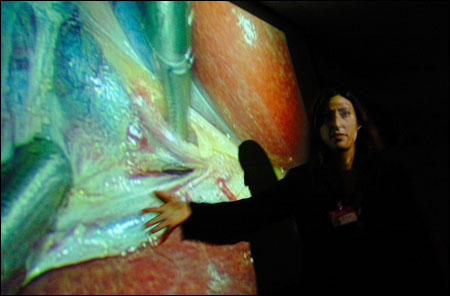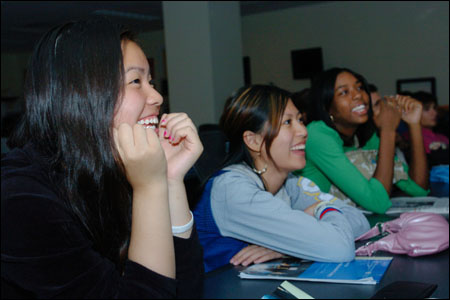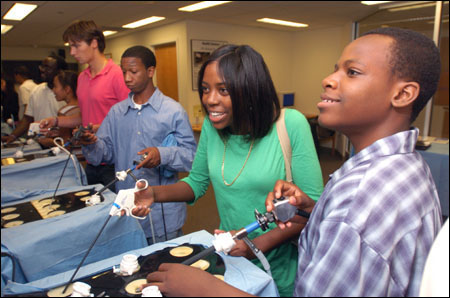Crimson Summer Academy students get a taste of doctor’s life
(Students see gall bladder surgery as it happens)

The chorus of “eeews” when the microsurgery port punched its way into the patient’s abdomen quickly gave way to an awed silence as the surgical tools passed through the port and began their work.
After a moment of watching the magnified images snipping and manipulating on the room’s large screen, the 30 Cambridge and Boston high school students attending Harvard’s Crimson Summer Academy began asking questions: “Is the gall bladder a vestigial structure?” “How come it doesn’t bleed?” “Is it possible to take out just part of it?”
Instructor in Medicine and surgeon in Beth Israel Deaconess Medical Center’s Division of Minimally Invasive Surgery Vivian Sanchez and Crimson Summer Academy (CSA) instructor Rami Alwan took turns answering: The gall bladder is not vestigial, they told the group. It stores bile created by the liver and releases it into the intestines to help digest fat. There is no bleeding because the ports were inserted in a way that didn’t sever any blood vessels, and no, it’s not possible to take out just part of the gall bladder, the whole thing has to come out.

“I have so much more respect for a doctor than I had before,” Laura Ospina, a junior at Cambridge Rindge & Latin said after the surgery. “You have a person’s life in your hands.”
The gall bladder surgery was just part of a daylong outing to Harvard teaching hospital Beth Israel Deaconess earlier this month (Aug. 4) by CSA students. The students spent the day learning about surgery in lectures and tours of the operating room, through hands-on microsurgery demonstrations, and by watching the gall bladder operation as it happened, projected onto a big screen in a hospital classroom.
Through their questions and answers, students learned that although the gall bladder excretes bile into the intestines, the bile originates in the liver, making the gall bladder a nonessential organ. Because of this, it’s routinely removed when it malfunctions and forms painful stones. Bile, however, continues to be produced by the liver even after the gall bladder is removed and although it trickles into the intestines to help digest fat, it is not regulated as well as when the gall bladder is present.
Sanchez said the hospital began doing this type of surgery in 1996 and today it’s one of the most common surgeries performed. Sanchez said she herself had performed three or four gall bladder surgeries the week before.

“It’s a rare opportunity,” said Madelyn Voong, a junior at John D. O’Bryant High School in Boston. “I’ve never watched [surgery] before.”
From viewing to doing
Students also got to try their hands using the microsurgery tools. Beginning with moving blocks and beans, they progressed to stitching and tying knots. The students soon discovered that manipulating the tools can be tricky, gaining a new respect for the surgeon’s precise movements on the screen.
Harvard senior Rebecca Zeidel, a mentor in the CSA program, said the experience allowed students to go from hearing about surgery to practicing with surgical instruments to actually watching surgery be performed.
“It’s been fantastic, it’s been very hands-on,” said Zeidel. “It’s giving them the opportunity to see so much, to experience so much.”
Alwan, who teaches science at Lincoln-Sudbury Regional High School, said few high school students get to have such an in-depth experience and gain an insider’s view of how surgery is performed today.
“They’d never be able to see anything like this,” Alwan said, going on to praise the students’ interest and drive. “The level of motivation that these kids have is phenomenal. As a teacher, that’s what you want.”
The students are in the second year of the Crimson Summer Academy, an innovative three-year summer program at Harvard aimed at academically talented but financially disadvantaged students from Cambridge and Boston. The program provides intensive instruction and support for the students with the aim of helping them go on to a four-year college or university after they graduate high school.
The program, part of Harvard President Lawrence H. Summers’ emphasis of improving access to college for economically disadvantaged students, exposes the high school students to a summer academic program, provides yearlong mentoring by Harvard students, and offers financial support, including a laptop computer, a stipend to replace lost summer earnings, and the promise of a $3,000 scholarship to the college of their choice on completion.
Sanchez, who helped run the day at Beth Israel Deaconess, said a similar summer program that she attended at Radcliffe in the late 1980s, the Radcliffe Summer Program in Science, gave her the confidence to attend Harvard and, ultimately, to become a doctor.
“That’s kind of what led me to do this,” Sanchez said. “It opened the door for me to attend Harvard. It gave me the confidence that I could take Harvard courses and pass.”




